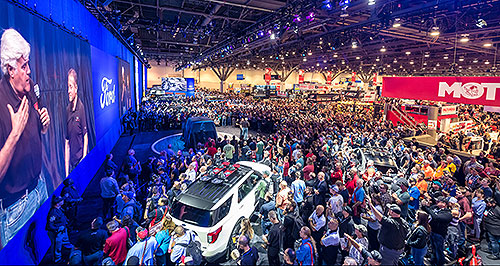Make / Model Search
News - Market Insight - Market Insight 2020Market Insight: Positive outlook in US aftermarketShow goer: The annual SEMA show has been running since 1967, attracting huge crowds and the world’s biggest manufacturers and buyers within the automotive specialty equipment industry. SEMA survey shows US aftermarket sector is staying relatively strong amid COVID-19Gallery Click to see larger images 21 Apr 2020 By TERRY MARTIN A SURVEY conducted by the Specialty Equipment Market Association (SEMA) in the United States this month shows that the aftermarket sector in the huge American automotive industry is maintaining a positive outlook during the coronavirus pandemic.
Just as it has in Australia, the COVID-19 virus has impacted US specialty automotive equipment manufacturers and suppliers, throwing many businesses into turmoil as they navigate their way through a period of reduced demand, executive orders closing non-essential businesses, social distancing measures, potential diversification into personal protective equipment, and so on.
But the results of the SEMA survey of more than 2000 people employed in the specialty equipment industry, conducted from April 1-7, shows that “even in these difficult times, our industry is resilient and working diligently to move past this disruption”.
SEMA Market Research director Gavin Knapp said most businesses in the industry are maintaining a positive outlook amid the coronavirus crisis, with 87 per cent of respondents reporting that they are “impacted short-term, but will get through it” or are “business as usual”.
He said that even with ‘shelter in place’ orders in place in many states – a directive for Americans to stay at home for anything other than those activities deemed essential – most industry facilities remain open under the essential business designations.
Indeed, two thirds of industry businesses reported in the survey as not having closed any of their sites as a result of the pandemic across the US.
“More than half of the industry’s employees continue to work from the company site, as the large number of production, technical, logistical and retail positions can only be done at the jobsite,” Mr Knapp said.
“The strength of the industry is shown in the finding that 82 per cent of employees are still on the job at their worksite or from home.”
Mr Knapp was quick to add, however, that while most businesses remain open, overall sales have been affected by the crisis.
A third of respondents (33 per cent) reported that current sales were down more than 40 per cent compared to this month last year, while 21 per cent said sales volume had fallen between 30 and 40 per cent.
Another 34 per cent of respondents said their current sales ranged from somewhat higher to down 20 per cent.
SEMA is a trade association that consists of a diverse group of manufacturers, distributors, retailers, publishing companies, auto restorers, street rod builders, restylers, car clubs, race teams and more.
These are typically small to medium-sized businesses, with an owner entering the industry as an enthusiast whose passion led to a career.
SEMA also runs the world’s premier automotive trade show, which represents the $US44.6 billion ($A69.6b) auto aftermarket industry and remains scheduled to run in Las Vegas in November this year, albeit with contingency plans now in place.
The organisation is running webinars and providing detailed information on its website to help members understand newly introduced legislative changes such as payroll protection programs and paid leave laws, and to assist them in accessing federal aid, emergency loans and other services such as counselling.
It also has a 50-state tracking guide with specific coronavirus-related information as it applies across the US, and details on how SEMA members can assist non-profit and other organisations working on the front lines of the emergency.
That said, there is confusion throughout the industry due to inconsistent rules across various states, prompting SEMA to join with eight other automotive trade associations to lobby for a national approach to defining ‘essential’ businesses and workers.
The industry wants national adoption of the US Department of Homeland Security’s guidance on the definition, which identifies automotive repair, maintenance and transportation equipment manufacturing and distribution facilities as essential services.
In a letter to the National Governors Association and the governors of all 50 US states, SEMA president and CEO Christopher Kersting was among the industry heavyweights seeking “a uniform national approach for protecting the country’s critical transportation and manufacturing needs”.
“Our member companies are making difficult decisions at the state and local level to address the COVID-19 challenge while ensuring the safety of their workers and the financial future of their businesses,” the letter said.
“Many of these companies operate in multiple states, creating the added task of understanding designations for multiple jurisdictions. With respect to how each state defines ‘essential’ businesses, having a single national approach would help eliminate confusion and complications.”
Other signatories to the letter included the Auto Care Association, Automotive Oil Change Association, Automotive Service Association, California Automotive Business Coalition, Motor & Equipment Manufacturers Association, Tire Industry Association, Service Station Dealers of America and Allied Trades, and the US Tire Manufacturers Association.  Read more26th of March 2020  AIC offers 3D printing to health authoritiesCOVID-19 response could be first deployment of 3D printing at Auto Innovation Centre16th of December 2019  AIC to meet strong demand for testingNew Auto Innovation Centres to build data library that aftermarket can draw on16th of December 2019  Parts sector aims to iron out state roadblocksNew AIC could eliminate cross-border regulatory hassles for accessory manufacturers16th of December 2019  First Auto Innovation Centre up and runningVictorian AIC open, SA to follow, in bid to maintain viability of local parts sector |
Click to shareMarket Insight articlesResearch Market Insight Motor industry news |












Facebook Twitter Instagram